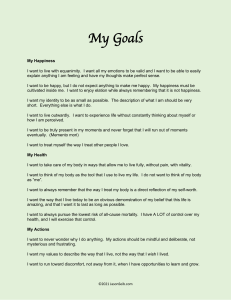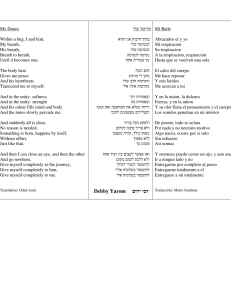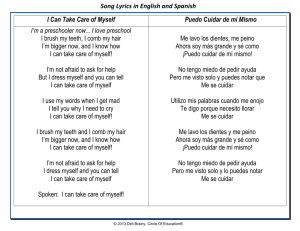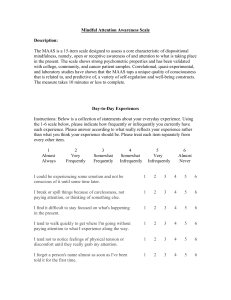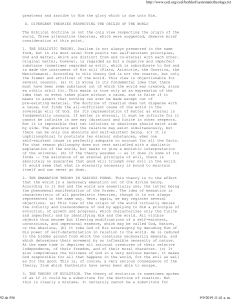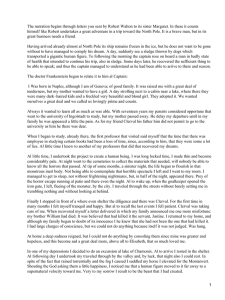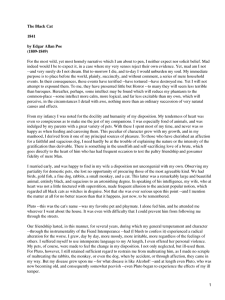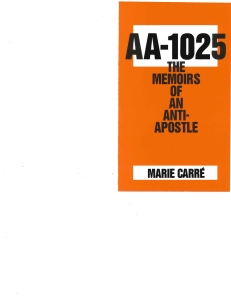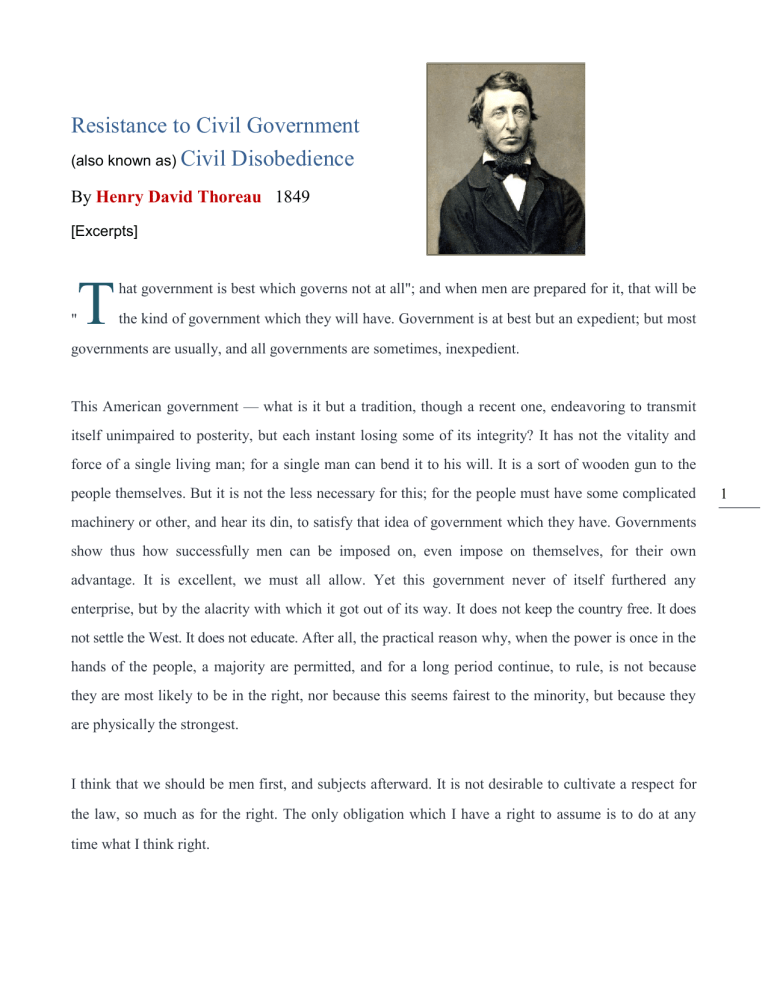
Resistance to Civil Government (also known as) Civil Disobedience By Henry David Thoreau 1849 [Excerpts] T " hat government is best which governs not at all"; and when men are prepared for it, that will be the kind of government which they will have. Government is at best but an expedient; but most governments are usually, and all governments are sometimes, inexpedient. This American government — what is it but a tradition, though a recent one, endeavoring to transmit itself unimpaired to posterity, but each instant losing some of its integrity? It has not the vitality and force of a single living man; for a single man can bend it to his will. It is a sort of wooden gun to the people themselves. But it is not the less necessary for this; for the people must have some complicated machinery or other, and hear its din, to satisfy that idea of government which they have. Governments show thus how successfully men can be imposed on, even impose on themselves, for their own advantage. It is excellent, we must all allow. Yet this government never of itself furthered any enterprise, but by the alacrity with which it got out of its way. It does not keep the country free. It does not settle the West. It does not educate. After all, the practical reason why, when the power is once in the hands of the people, a majority are permitted, and for a long period continue, to rule, is not because they are most likely to be in the right, nor because this seems fairest to the minority, but because they are physically the strongest. I think that we should be men first, and subjects afterward. It is not desirable to cultivate a respect for the law, so much as for the right. The only obligation which I have a right to assume is to do at any time what I think right. 1 Law never made men a whit more just; and, by means of their respect for it, even the well-disposed are daily made the agents of injustice. A common and natural result of an undue respect for law is, that you may see a file of soldiers, colonel, captain, corporal, privates, powder-monkeys, and all, marching in admirable order over hill and dale to the wars, against their wills, ay, against their common sense and consciences, which makes it very steep marching indeed, and produces a palpitation of the heart. They have no doubt that it is a damnable business in which they are concerned; they are all peaceably inclined. Now, what are they? Men at all? Or small movable forts and magazines, at the service of some unscrupulous man in power? The mass of men serve the state thus, not as men mainly, but as machines, with their bodies. They are the standing army, and the militia, jailers, constables, posse comitatus, etc. In most cases there is no free exercise whatever of the judgment or of the moral sense; but they put themselves on a level with wood and earth and stones; and wooden men can perhaps be manufactured that will serve the purpose as well. Such command no more respect than men of straw or a lump of dirt. They have the same sort of worth only as horses and dogs. Yet such as these even are commonly esteemed good citizens. Others, as most legislators, politicians, lawyers, ministers, and office-holders, serve the state chiefly with their heads; and, as they rarely make any moral distinctions, they are as likely to serve the devil, without intending it, as God. A very few, as heroes, patriots, martyrs, reformers in the great sense, and men, serve the state with their consciences also, and so necessarily resist it for the most part; and they are commonly treated as enemies by it. A wise man will only be useful as a man, and will not submit to be "clay," and "stop a hole to keep the wind away," but leave that office to his dust at least... He who gives himself entirely to his fellow-men appears to them useless and selfish; but he who gives himself partially to them is pronounced a benefactor and philanthropist. How does it become a man to behave toward this American government to-day? I answer, that he cannot without disgrace be associated with it. I cannot for an instant recognize that political organization as my government which is the slave's government also. 2 All men recognize the right of revolution; that is, the right to refuse allegiance to, and to resist, the government, when its tyranny or its inefficiency are great and unendurable. But almost all say that such is not the case now. But such was the case, they think, in the Revolution of '75. If one were to tell me that this was a bad government because it taxed certain foreign commodities brought to its ports, it is most probable that I should not make an ado about it, for I can do without them. All machines have their friction; and possibly this does enough good to counterbalance the evil. At any rate, it is a great evil to make a stir about it. But when the friction comes to have its machine, and oppression and robbery are organized, I say, let us not have such a machine any longer. In other words, when a sixth of the population of a nation which has undertaken to be the refuge of liberty are slaves, and a whole country is unjustly overrun and conquered by a foreign army, and subjected to military law, I think that it is not too soon for honest men to rebel and revolutionize. What makes this duty the more urgent is the fact that the country so overrun is not our own, but ours is the invading army. If I have unjustly wrested a plank from a drowning man, I must restore it to him though I drown myself… This people must cease to hold slaves, and to make war on Mexico, though it cost them their existence as a people. It is not a man's duty, as a matter of course, to devote himself to the eradication of any, even the most enormous wrong; he may still properly have other concerns to engage him; but it is his duty, at least, to wash his hands of it, and, if he gives it no thought longer, not to give it practically his support. If I devote myself to other pursuits and contemplations, I must first see, at least, that I do not pursue them sitting upon another man's shoulders. I must get off him first, that he may pursue his contemplations too. See what gross inconsistency is tolerated. I have heard some of my townsmen say, "I should like to have them order me out to help put down an insurrection of the slaves, or to march to Mexico; — see if I would go"; and yet these very men have each, directly by their allegiance, and so indirectly, at least, by their money, furnished a substitute. The soldier is applauded who refuses to serve in an unjust war by those who do not refuse to sustain the unjust government which makes the war; is applauded by those whose own act and authority he disregards and sets at naught; as if 3 the state were penitent to that degree that it hired one to scourge it while it sinned, but not to that degree that it left off sinning for a moment. Unjust laws exist; shall we be content to obey them, or shall we endeavor to amend them, and obey them until we have succeeded, or shall we transgress them at once? Men generally, under such a government as this, think that they ought to wait until they have persuaded the majority to alter them. They think that, if they should resist, the remedy would be worse than the evil. But it is the fault of the government itself that the remedy is worse than the evil. It makes it worse. If the injustice is part of the necessary friction of the machine of government, let it go, let it go; perchance it will wear smooth — certainly the machine will wear out. If the injustice has a spring, or a pulley, or a rope, or a crank, exclusively for itself, then perhaps you may consider whether the remedy will not be worse than the evil; but if it is of such a nature that it requires you to be the agent of injustice to another, then, I say, break the law. Let your life be a counter friction to stop the machine. What I have to do is to see, at any rate, that I do not lend myself to the wrong which I condemn. As for adopting the ways which the State has provided for remedying the evil, I know not of such ways. They take too much time, and a man's life will be gone. I have other affairs to attend to. I came into this world, not chiefly to make this a good place to live in, but to live in it, be it good or bad. A man has not everything to do, but something; and because he cannot do everything, it is not necessary that he should do something wrong. It is not my business to be petitioning the Governor or the Legislature any more than it is theirs to petition me; and if they should not hear my petition, what should I do then? But in this case the State has provided no way; its very Constitution is the evil. This may seem to be harsh and stubborn and unconciliatory; but it is to treat with the utmost kindness and consideration the only spirit that can appreciate or deserves it. So is a change for the better, like birth and death which convulse the body. 4 I do not hesitate to say, that those who call themselves Abolitionists should at once effectually withdraw their support, both in person and property, from the government of Massachusetts, and not wait till they constitute a majority of one, before they suffer the right to prevail through them. I think that it is enough if they have God on their side, without waiting for that other one. Moreover, any man more right than his neighbors constitutes a majority of one already. I know this well, that if one thousand, if one hundred, if ten men whom I could name — if ten honest men only — ay, if one HONEST man, in this State of Massachusetts, ceasing to hold slaves, were actually to withdraw from this co-partnership, and be locked up in the county jail therefor, it would be the abolition of slavery in America. For it matters not how small the beginning may seem to be: what is once well done is done forever. Under a government which imprisons any unjustly, the true place for a just man is also a prison. A minority is powerless while it conforms to the majority; it is not even a minority then; but it is irresistible when it clogs by its whole weight. If the alternative is to keep all just men in prison, or give up war and slavery, the State will not hesitate which to choose. If a thousand men were not to pay their tax-bills this year, that would not be a violent and bloody measure, as it would be to pay them, and enable the State to commit violence and shed innocent blood. This is, in fact, the definition of a peaceable revolution, if any such is possible. If the tax-gatherer, or any other public officer, asks me, as one has done, "But what shall I do?" my answer is, "If you really wish to do anything, resign your office." When the subject has refused allegiance, and the officer has resigned his office, then the revolution is accomplished. But even suppose blood should flow. Is there not a sort of blood shed when the conscience is wounded? Through this wound a man's real manhood and immortality flow out, and he bleeds to an everlasting death. I see this blood flowing now. I have paid no poll-tax for six years. I was put into a jail once on this account, for one night; and, 5 as I stood considering the walls of solid stone, two or three feet thick, the door of wood and iron, a foot thick, and the iron grating which strained the light, I could not help being struck with the foolishness of that institution which treated me as if I were mere flesh and blood and bones, to be locked up. I wondered that it should have concluded at length that this was the best use it could put me to, and had never thought to avail itself of my services in some way. I saw that, if there was a wall of stone between me and my townsmen, there was a still more difficult one to climb or break through, before they could get to be as free as I was. I did not for a moment feel confined, and the walls seemed a great waste of stone and mortar. I felt as if I alone of all my townsmen had paid my tax. They plainly did not know how to treat me, but behaved like persons who are underbred. In every threat and in every compliment there was a blunder; for they thought that my chief desire was to stand the other side of that stone wall. I could not but smile to see how industriously they locked the door on my meditations, which followed them out again without let or hindrance, and they were really all that was dangerous. As they could not reach me, they had resolved to punish my body; just as boys, if they cannot come at some person against whom they have a spite, will abuse his dog. I saw that the State was half-witted, that it was timid as a lone woman with her silver spoons, and that it did not know its friends from its foes, and I lost all my remaining respect for it, and pitied it. I sometimes say to myself, When many millions of men, without heat, without ill-will, without personal feeling of any kind, demand of you a few shillings only, without the possibility, such is their constitution, of retracting or altering their present demand, and without the possibility, on your side, of appeal to any other millions, why expose yourself to this overwhelming brute force? You do not resist cold and hunger, the winds and the waves, thus obstinately; you quietly submit to a thousand similar necessities. You do not put your head into the fire. But just in proportion as I regard this as not wholly a brute force, but partly a human force, and consider that I have relations to those millions as to so many millions of men, and not of mere brute or inanimate things, I see that appeal is possible, first and instantaneously, from them to the Maker of them, and, secondly, from them to themselves. But, if I put my head deliberately into the fire, there is no appeal to fire or to the Maker of fire, and I have only myself to blame. If I could convince myself that I have any right to be satisfied with men as they are, 6 and to treat them accordingly, and not according, in some respects, to my requisitions and expectations of what they and I ought to be, then, like a good Mussulman and fatalist, I should endeavor to be satisfied with things as they are, and say it is the will of God. And, above all, there is this difference between resisting this and a purely brute or natural force, that I can resist this with some effect; but I cannot expect, like Orpheus, to change the nature of the rocks and trees and beasts. There will never be a really free and enlightened State until the State comes to recognize the individual as a higher and independent power, from which all its own power and authority are derived, and treats him accordingly. I please myself with imagining a State at least which can afford to be just to all men, and to treat the individual with respect as a neighbor; which even would not think it inconsistent with its own repose if a few were to live aloof from it, not meddling with it, nor embraced by it, who fulfilled all the duties of neighbors and fellow-men. A State which bore this kind of fruit, and suffered it to drop off as fast as it ripened, would prepare the way for a still more perfect and glorious State, which also I have imagined, but not yet anywhere seen. Thoreau wrote this essay after spending a night in jail for refusing to pay a tax that would be used, in part, to pay for the Mexican War, which he considered to be unjust. According to a popular story, Thoreau’s friend, the essayist Ralph Waldo Emerson, visited him in prison and asked, “Henry, what are you doing in there?” to which Thoreau replied, “Waldo, the question is what are you doing out there?” Thoreau’s essay has inspired reformists all over the world, including Leo Tolstoy, Mahatma Gandhi and Martin Luther King. 7
